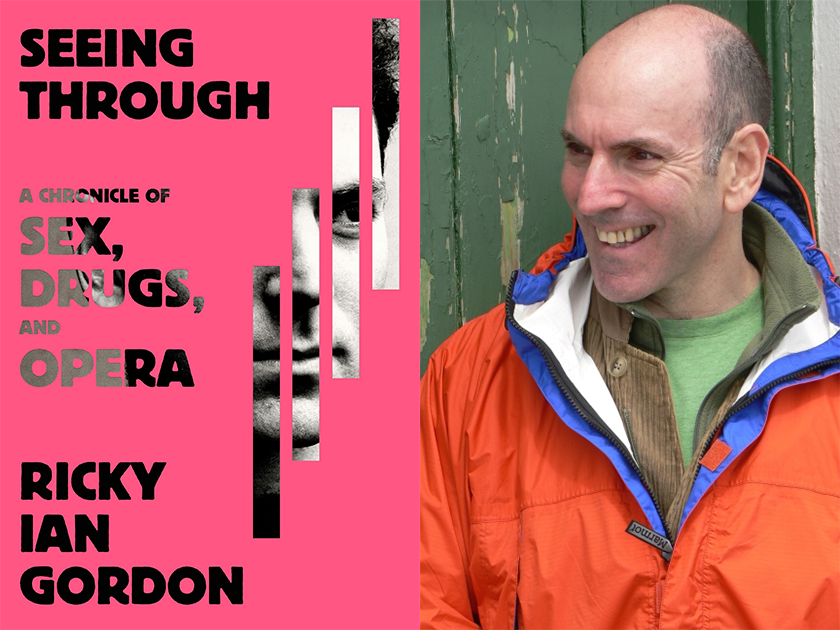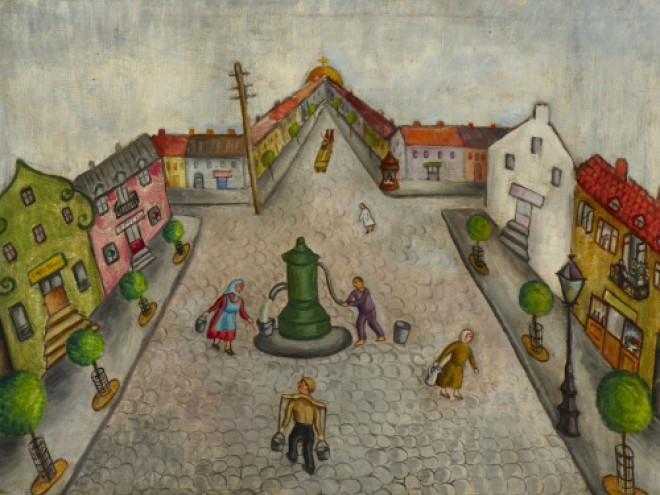
Author photo by Kevin Doyle
Composer Ricky Ian Gordon’s candid autobiography, Seeing Through: A Chronicle of Sex, Drugs, and Opera, reveals how a gifted young man from Long Island became a celebrated composer of song and opera. Bob Goldfarb spoke with him about his early influences, fate, and the Jewishness permeating his works.
Bob Goldfarb: What led you to write a memoir?
Ricky Ian Gordon: I started a writing group with writers I really admire. I was experimenting with how deeply I wanted to be known. And in the end, I do believe Seeing Through is a realistic depiction of the very messy life of one artist.
BG: A lot of your work is interested in Jewish life and Jewish people, such as the operas The Garden of the Finzi Continis and Morning Star.
RIG: My mother spoke Yiddish! It permeates me. It’s very strong inside me.
BG: You’ve collaborated with a lot of Jews. And your work is often compared with the music of Leonard Bernstein and Stephen Sondheim.
RIG: My opera Intimate Apparel, which I wrote with Lynn Nottage, has an incredible character: a Jewish tailor from Romania! I completely poured myself into that role. I have a need to express my Jewishness in my work.
BG: The subtitle of your book mentions “sex, drugs, and opera,” which also seems part of the project of making yourself known.
RIG: I told my editor, Jonathan Galassi, that he probably didn’t need another composer memoir, analyzing music! If there’s anything beautiful in my music, it comes from my life experience.
BG: Weren’t you already thinking of writing about your life over thirty years ago?
RIG: That was in the late 1980s, and it became a musical called Sycamore Trees. Believe it or not, a recording of a performance from 2010 was just discovered, and it will be issued in August!
BG: In the book you talk about a dilemma: whether you wanted to focus on being a composer, or if you’d rather lead a profligate life. It seems like you did both.
RIG: As I say at the end of the book, I had to “feed both wolves.” But I couldn’t do both with alcohol and drugs.
BG: Your artistic curiosity seems to have started early. Even when you were very young, you were already engaging with complex, challenging works like Ingmar Bergman movies.
RIG: All I am is everything I have been irrepressibly drawn to. I know now that, even as a little boy, I was cultivating ways of telling stories. I was in pain, and I needed to tell my story with all the intensity of the artists I admire — in film, paintings, literature.
All I am is everything I have been irrepressibly drawn to.
BG: You wrote at one point that it’s important for you to be “naked” in your work. It seems as though that impulse was always there, and that you never wanted to disguise it.
RIG: It’s Bergmanesque! Bergman was my favorite artist growing up. Think about The Passion of Anna. At various points the actors stop acting and start talking about playing their characters. And when they express their agony, and they are not acting. It changed me.
BG: One piece of music which caught your attention when you were young was by Dmitri Kabalevsky, and you mention that your favorite opera is Alban Berg’s Lulu! What attracted you to them?
RIG: The Kabalevsky sonatina has polytonality! Crunchy chords. So it makes sense that that would lead to Alban Berg, who found a way to make serialism exquisitely beautiful. And Lulu, of all the operas I know, is the one most like a foreign film: a deep investigation of character. It has a level of complexity at every layer which never stops revealing itself, and that’s what I appreciate about it.
BG: You’ve talked about fate, “where God comes in.” Writing about your late lover Jeffrey, you describe a sequence of events that seem uncannily predestined. The last opera that you had seen together was Death in Venice, an opera about someone dying in a plague. Soon after, he died of AIDS.
RIG: And there was the keychain I saw on a sidewalk, which said “I am with you always.” And then, the day of his funeral, finding his T‑shirt which read “Still Here.” There’s a saying in Alcoholics Anonymous: after the first miracle, it’s vulgar to doubt. I have a sense of “the world behind the world.” I know there’s more happening than just this. It makes sense that Stravinsky finally got God.
BG: You’ve composed musical settings of prose and poetry by many writers of daunting stature, including Proust, Steinbeck, and poets such as E. E. Cummings, Frank O’Hara, Paul Celan, Frank Bidart, Langston Hughes, Dorothy Parker, John Ashbery, W. S. Merwin, Sylvia Plath, and Gwendolyn Brooks. It must take a kind of bravery to “collaborate” with such great artists.
RIG: Bravery is the word! With Grapes of Wrath I was terrified. And what was really scary was setting Ellen West—this towering, monumental text — because Frank Bidart is still living. But I don’t want to work with words that I don’t think are great.
BG: Do you have any new projects taking shape?
RIG: Lynn Nottage and I, as well as her daughter, Ruby, were commissioned to write an opera, This House, for the fiftieth anniversary of Opera Theater of St. Louis which will premiere next spring. And I really hope The Metropolitan Opera will do a full production of Grapes of Wrath—there have been enough concert versions! But I’m really lucky that I’m published, recorded, and performed. And I make my living as a composer. That’s a lot more than most composers can say, so I can’t kvetch too much!
Bob Goldfarb is President Emeritus of Jewish Creativity International.



